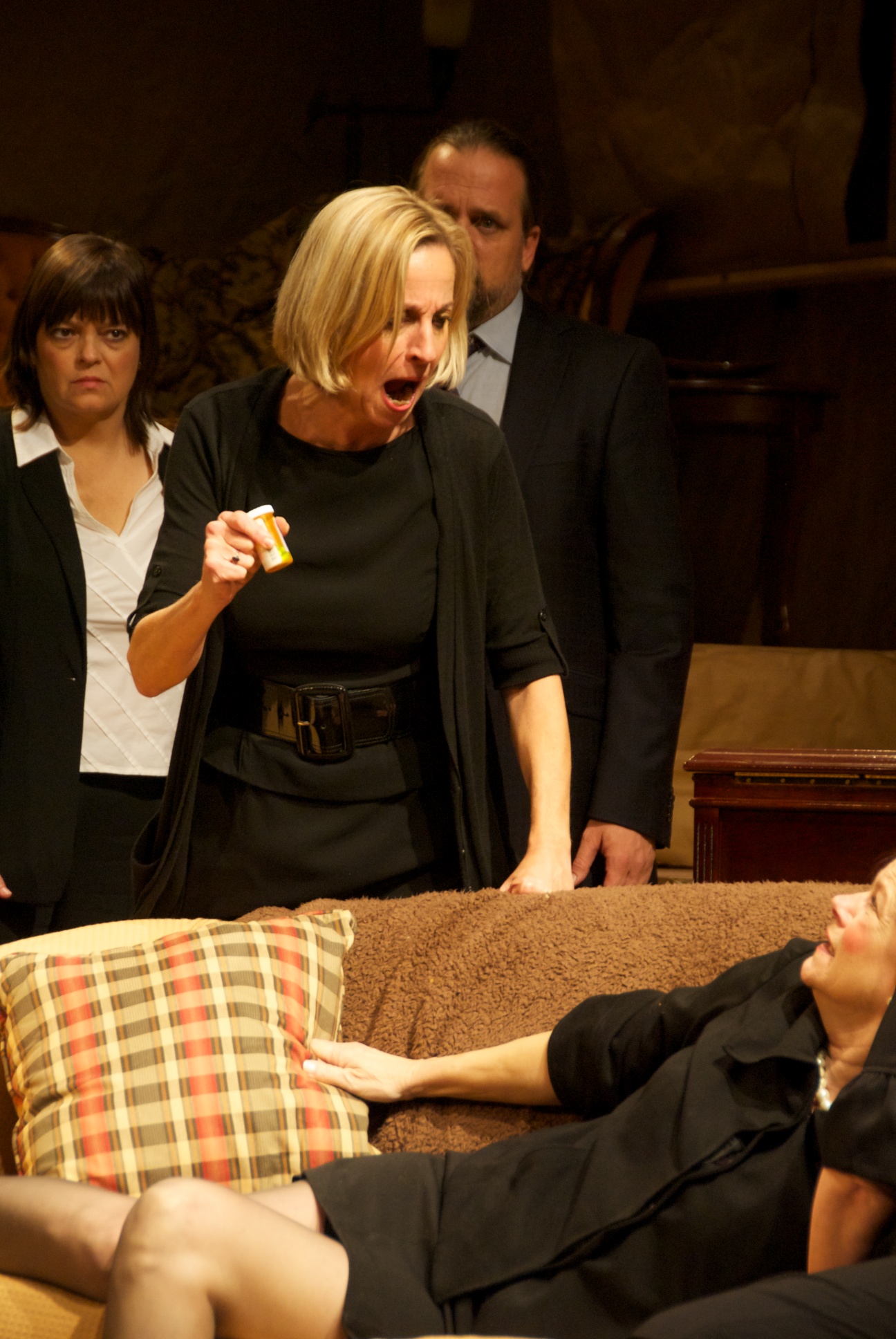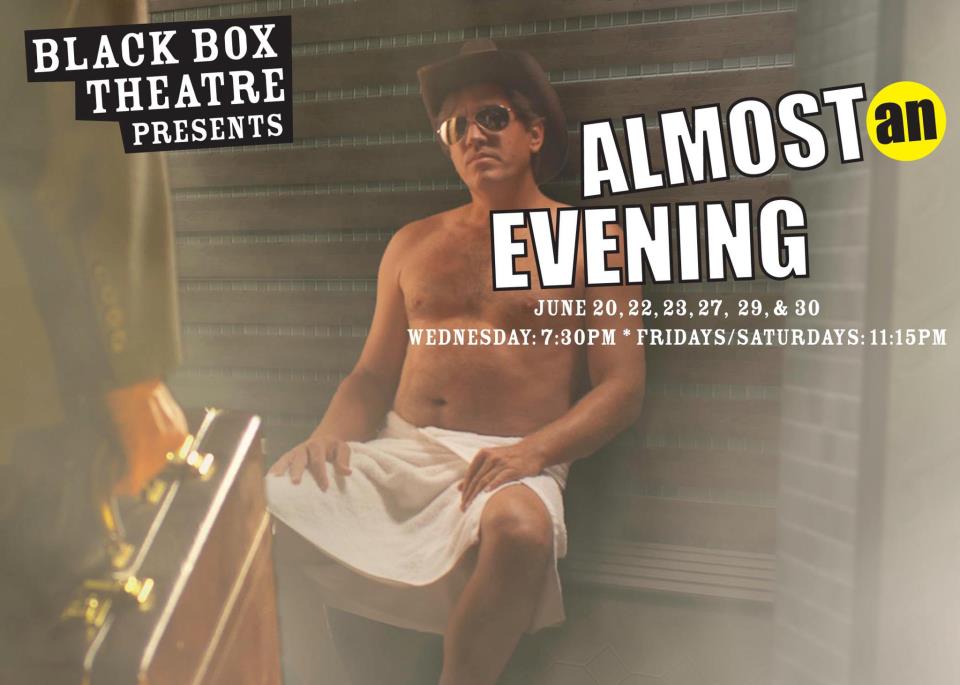 Jasper loves dysfunctional families. Wait, let's clarify that - Jasper loves Pulitzer Prize-winning dramas about dysfunctional families, and there's a doozy of one running right now through Sat. Nov. 12th, at Trustus Theatre. August: Osage County, by Tracy Letts, is billed as Jim Thigpen's directorial swan song; he and wife Kay, with whom he founded Trustus 26 years ago, will retire at the end of this season (see the current issue of Jasper at http://jaspercolumbia.net/current-issue/ for details.) Fortunately, he has assembled a highly functional cast of family, both literal (brother Ron Hale and daughter Erin Wilson) and theatrical (a veritable who's who of local theatrical talent) to bring this provocative and compelling work to Columbia audiences.
Jasper loves dysfunctional families. Wait, let's clarify that - Jasper loves Pulitzer Prize-winning dramas about dysfunctional families, and there's a doozy of one running right now through Sat. Nov. 12th, at Trustus Theatre. August: Osage County, by Tracy Letts, is billed as Jim Thigpen's directorial swan song; he and wife Kay, with whom he founded Trustus 26 years ago, will retire at the end of this season (see the current issue of Jasper at http://jaspercolumbia.net/current-issue/ for details.) Fortunately, he has assembled a highly functional cast of family, both literal (brother Ron Hale and daughter Erin Wilson) and theatrical (a veritable who's who of local theatrical talent) to bring this provocative and compelling work to Columbia audiences.
The show recounts a few weeks in the lives of the Weston family, disrupted by the disappearance of the father. His three daughters return home, family and significant others in tow, to support their mother, and along the way we meet an aunt, and uncle, a cousin, and a few innocent bystanders. I was only familiar with this work from some reviews I read a few years ago, when it premiered and promptly won the Tony and N.Y. Drama Critics' Circle Awards for Best Play, the Drama Desk and Outer Critics' Circle Awards for Best New Play, and the Pulitzer. As a result, I had some misconceptions going in. This is in no way, shape or fashion a comedy, even a dark one. There are certainly some witty lines; most of the characters are fairly eloquent people connected to academia, and often barbs spoken in moments of great anger, frustration, and passion get some big laughs. Nevertheless, this play is a tragedy of the ordinary, an examination of the dark underbelly of contemporary American society, depicted before us via one truly unfortunate family.
Likewise, the title notwithstanding, this isn't really a rural or country-themed play at all. While there is a plaid shirt here, some cowboy boots there, a backdrop that suggests dull stucco or adobe walls, and a Native American housekeeper, the setting isn't so much Oklahoma as it is any desolate location, and the desolation is as much spiritual as literal. One character notes that this isn't the Midwest, but rather the Plains, which he compares to the Blues, just not as interesting. Nor is the show particularly surreal or avant-garde, as I somehow had expected. Sadly, the obstacles that confront these characters (with perhaps one Southern Gothic exception) are all too commonplace: divorce, infidelity, youthful rebellion, repression, substance abuse, suicide, and depression. The language is sometimes quite eloquent and poetic, but more often quite down-to-earth and familiar.

Yet this is a tremendously entertaining evening at the theatre, thanks to the supremely talented cast. While each of the thirteen actors gets his or her moment to shine on stage, top honors have to go to Libby Campbell Turner, in the central role of Violet, the harsh matriarch of the Weston family. We first see Violet helplessly struggling to form her words and thoughts as a result of her addiction to painkillers; the effect is shocking, especially for those familiar with Campbell Turner's assertive stage presence in any number of shows over the last several decades. Have no fear, however: Violet's coherence returns with a vengeance, as she tries to bring down each of her three daughters in turn. We chillingly realize that while the pills may have loosened her tongue, they surely didn't create her venom.
Violet's main adversary is her eldest daughter, Barbara, played by Dewey Scott-Wiley. She and Paul Kaufmann (as her husband Bill) are masters of the stage whisper, which they must employ for a marital spat that they desperately wish to remain unheard. Scott-Wiley expertly depicts this ordinary yet complex character, as we see her first channeling her father in an alcohol-fueled intellectual ramble, then mirroring her mother, attempting in vain to control all around her, while still clad in her nightclothes.
Another standout is Gerald Floyd, as Violet's amiable but long-suffering brother-in-law whom she bitingly notes is now the family patriarch "by default," after her husband's disappearance. In a play where characters often naturalistically talk over one another, timing is everything, and Floyd is the champ, portraying a man who rarely gets a word in edgewise, yet always makes his point known. Late in the third act, his demand that his wife (played by Elena Martinez-Vidal) show some shred of decency and compassion to their son, was for me perhaps the most moving moment in the play.
Another cast member whose vocal talent must be noted is Ellen Rodillo-Fowler, as the housekeeper Johnna. Brassy and feisty just a few weeks ago in Third Finger, Left Hand, here she plays soft and stoic, often pausing a half-second before most of her lines, and thus showing the depth and thought behind them. Ron Hale, as Violet's husband, shines in the opening scene, waxing poetic and philosophical while concealing the depths of despair into which he has fallen. Sarah Crouch as the granddaughter Jean, Joe Morales as the local Sheriff, Kevin Bush as the supposed loser cousin "Little" Charles, Erin Wilson as the frustrated, plain-Jane middle daughter, and Robin Gottlieb as the somewhat spoiled youngest daughter who foolishly thinks she has escaped the family cycle, all do fine work, many playing against type. Stann Gwynn as Gottlieb's fiancé has perhaps the fewest lines, but is memorable for making the audience wonder which is creepier: his interaction with Jean (which quickly moves into "Like to watch gladiator movies?" territory) or his career as a yuppie entrepreneur profiting from the Persian Gulf conflict.

One suspects that just as every great actor must try Hamlet in his youth, Macbeth in middle age and Lear as he gets older, so too must every playwright, Letts included, take a stab at a tragedy of family dysfunction. August: Osage County presents us with no moral or lesson, but rather portrays people making the choices they must, but then living with the consequences. I was reminded more than once during the show of a line spoken by Clint Eastwood in the film Gran Torino, about how "the thing that haunts a man most is what he isn't ordered to do."
Critics have called this the first great play of the new century. I'm not so sure I'd quite go that far, but there are certainly echoes of any number of classics: Lillian Hellman's "little foxes, that spoil the vines," the spectre of substance abuse from A Long Day's Journey Into Night, the bleak sense of frustration and yearning from Chekhov's The Three Sisters and Turgenev's A Month in the Country, families coping with long-repressed secrets from Come Back to the Five and Dime, Jimmy Dean, Jimmy Dean, Ibsen's The Wild Duck, and a dozen Tennessee Williams works, and the domestic battles in the homes of academics from Who's Afraid of Virginia Woolf? and On Golden Pond. Shoot, stick togas on the Westons and you'd basically have the cursed House of Atreus. Time will tell if this is the latest retelling of eternal themes from the human experience, or a well-crafted pastiche of those themes, designed as an acting tour-de-force for a talented ensemble.
Either way, it rarely gets better than this if you want to see some of Columbia's finest performers flexing their dramatic muscles in some rich and juicy material. Director Thigpen made a wise choice for his finale, and deftly pulls it all together for a rich and thought-provoking evening at the theatre.
If you're going, note that the show runs a solid three and a half hours, with two intermissions, but it feels like not much more than two. Just be sure to make dinner and babysitter arrangements accordingly. Call the Trustus Box Office at 254-9732 for ticket information.
~ August Krickel





